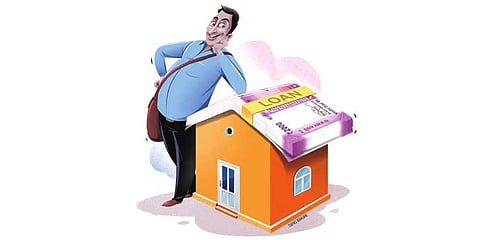

The Reserve Bank of India celebrated the Financial Literacy week last week. They organised online events across social media platforms and the thrust was on three essential things. These included explaining to people that they should borrow for needs and not for wants. The need to borrow from a registered intermediary like a bank or a non-banking finance company. And to ensure that one repays their loans on time and does not miss out on the monthly payments.
Not sure how many of you noticed it. The overall intention is to encourage everyone to borrow sensibly. When it comes to loans, Indian households are conservative compared to those in the United States and other wealthy countries. Personal loans account for `26 lakh crore, according to the latest data from the RBI. That is about 10 per cent of the country’s gross domestic product or GDP. In rich countries like the US, the number is over 80 per cent.
Over the past six months, the Nifty Bank index has jumped 62 per cent. During the same period, the Nifty has moved on by 32 per cent. Stock markets are betting on robust growth in the banking sector over the next several years. They look at the opportunity for banks and NBFCs to lend more to India’s vast population. As countries grow rich, retail loans increase and India is likely to witness a similar boom over the next few years as more people borrow money for their personal needs. Half of the personal loans in India are home loans. That is a sensible approach to borrowing.
If you are new to work, you must understand the nuances of a debt trap. Borrowing too much on credit cards or taking personal loans for spending is a sure-shot way of triggering a debt trap. When one is young, the tendency is to spend more and save less. In an ideal world, it should be the reverse. If you wish to pay, think of buying a home in your early twenties.
Considering the cost of an apartment in a metro city, you will realise that you need to save a lot more to have enough for merely the down-payment that will be required. It would help if you also had a steady job or business to ensure that you can pay the equated monthly instalment or EMI. It may sound daunting at the start. However, if you keep your focus on homeownership, you will prioritise your spending. A foreign holiday or a luxury car would be ideas to look at a bit later down the road.
You will spend less each month knowing that the goal is to save for the massive down payment before getting your home purchases funded. Taking a home loan is an excellent personal finance move. First of all, it helps you create an asset for yourself and your family. It is the cheapest loan available to you as an individual. If you take a series of small personal loans on your credit card or through your bank, you will end up paying a lot higher interest to your bank.
The other advantage of taking a home loan from an RBI registered institution is that you get tax benefits. Suppose you consider the money you would save on the section 80C deduction of your loan principal repayment and the interest rate deduction under section 24 of the Income Tax Act. In that case, your effective interest rate is even lower. When you maintain a good track record of repayments over the next four to five years, you will keep a good credit record.
The advantage of a good credit record is that banks would be happy to lend you money at a reasonable interest rate for emergencies. However, the best option you have is to take a top-up loan on your home loan, if you need money to fund any short-term expenditure like a wedding or a foreign holiday. That is assuming you have been a good borrower. Just like the RBI Financial Literacy Week campaign, if you have paid your EMIs on time, you would become eligible for better top-up loan terms. If you wish to own a home, it is good to start very early in your work life. A home loan is a very constructive way to help yourself realise that dream.
Indian households are conservative borrowers
When it comes to loans, Indian households are conservative compared to those in the US. Personal loans account for about 10% of GDP, in the US, the number is over 80%
Advantage home loans
It is the cheapest loan available to you as an individual, since personal loans cost more interest. Home loans also offer savings in the form of tax exemptions
Rs 26L cr total worth of personal loans
10% of GDP Worth of these personal loans
Taking a home loan early on can be an excellent personal finance move. It helps you create an asset for yourself and your family, and is the cheapest type of loan available to you as an individual borrower.
(The author is editor-in-chief at www.moneyminute.in)